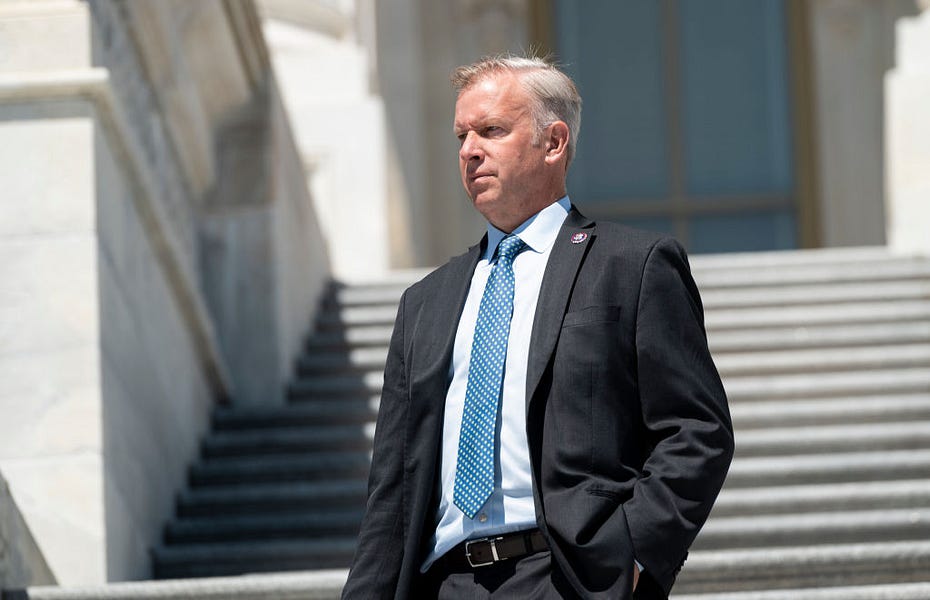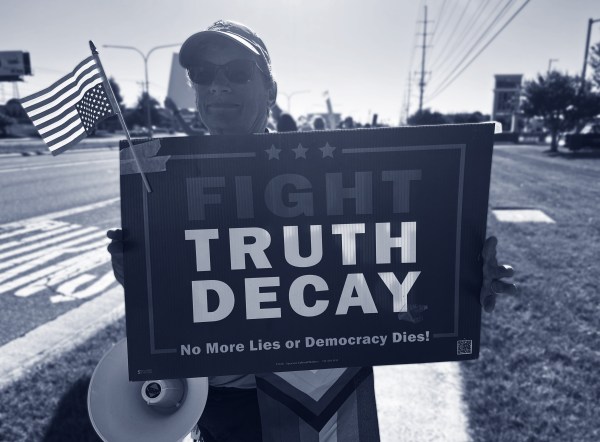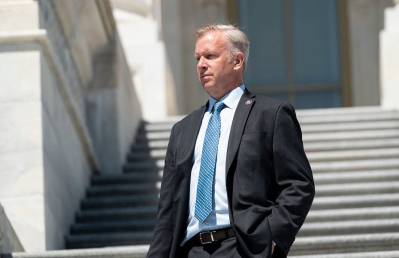After an 18-year-old gunman murdered 10 of GOP Rep. Chris Jacobs’ constituents in a Buffalo supermarket late last month, the congressman felt he was at a crossroads.
He could almost assuredly sail to victory during his Republican primary—as he did in 2020—in New York’s newly drawn but still ruby-red 23rd District with robust support from pro-Second Amendment groups like the National Rifle Association (NRA) and Gun Owners of America New York. Or, he could make a gamble that in light of the Buffalo tragedy, his constituents might be looking for a change of heart on gun control.
Late last month, Jacobs sealed his electoral fate. “I want to be completely transparent of where I am in Congress,” Jacobs said during a May 27 press conference. “If an assault weapons ban bill came to the floor that would ban something like an AR-15, I would vote for it.”
The political blowback was swift and unforgiving. Jacobs’ credibility among Second Amendment organizations and local Republican officials evaporated almost instantly, as did his reelection prospects. One week after voicing his support for a ban on semiautomatic rifles, he announced he would not seek reelection.
At that point he felt he had nothing to lose. Days after announcing his congressional retirement, Jacobs followed through with his promise to support a semiautomatic rifle ban, joining all but two House Democrats in voting in favor of the “Protecting Our Kids Act,” a sweeping gun control package that would also ban high capacity magazines and raise the minimum age to purchase a firearm nationally from 18 to 21 years old, among other controversial proposals. The bill passed the House in a 223-204 vote but is expected to be dead on arrival in the Senate.
As gun control legislation’s most recent electoral casualty, Jacobs represents the Republican Party’s decades-long dilemma when it comes to crafting a legislative response to mass shootings. “It seems like our parties have certain things you have to be an absolutist on or you’re not part of the party in a way,” Jacobs said in an interview last week. “We have that on guns. I think the Democrats have it on abortion.”
Senate Minority Leader Mitch McConnell isn’t willing to accept that truism. In the wake of last month’s deadly mass shootings in Buffalo and Uvalde, Texas, he tapped GOP Sen. John Cornyn of Texas to lead the charge in crafting a bipartisan gun control bill alongside Democratic Sens. Chris Murphy that could win support from enough Republicans to clear the filibuster.
The bipartisan group of negotiators, which also included Democratic Sen. Kyrsten Sinema and GOP Sen. Thom Tillis, released the full 80-page text of the “Bipartisan Safer Communities Act” on Wednesday with the intent of pushing the bill to a floor vote before senators return to their home states this weekend for their July 4 recess. The bill cleared the Senate late Thursday evening in a 65-33 vote with two Republicans absent. It’s expected to pass in the House later today.
If enacted, the bill would invest heavily into mental health clinics and school safety measures, provide grants to states that adopt red flag laws, and expand the background checks process for firearm buyers who are under the age of 21, among other measures.
Fifteen Republican senators, including McConnell, joined every Democrat in voting to advance the bill to the House—but not without serious backlash from GOP senators, some of whom said ahead of the vote that they felt hung out to dry once they realized that the compromise would be negotiated entirely behind closed doors.
“No one’s telling me anything. I’ve just asked for the text, and I haven’t gotten anything,” National Republican Senatorial Committee Chairman and Florida Sen. Rick Scott told Axios last week.
The NRA and Gun Owners of America were the next chips to fall, voicing swift opposition to the bill and the Republican lawmakers who voted in favor of advancing it.
“The NRA and the Gun Owners of America, they’re using this as a major fundraising tool,” GOP Rep. Fred Upton, one of five House Republicans to vote in favor of the “Protecting Our Kids Act,” said in an interview Wednesday. “NRA went bankrupt a couple years ago, so this is the way that they can replenish their stocks.”
None of this political fallout comes as any surprise to Cornyn, who was greeted with a chorus of boos at the Texas GOP convention last Friday when he explained the meat and bones of the soon-to-be-released bill to a crowd of Republican delegates.
Cornyn remains unbowed by the criticism. He told reporters Wednesday that he is confident that the bill will make its way to President Joe Biden’s desk despite opposition from House Republican leaders, and reiterated his and McConnell’s weeks-long mutual understanding that drumming up enough GOP support for the bill would be an uphill battle.
“I appreciate his confidence in me and my ability to actually come up with something that would [have] a chance of passing, but none of us were under any illusion that this would be a cakewalk,” Cornyn said of McConnell when speaking with reporters in the U.S. Capitol on Wednesday.
Cornyn, who is not up for reelection until 2026, spent the entire negotiating period operating under the understanding that no bill would be able to win most Republican senators’ support. As The Morning Dispatch noted earlier this month: “There are few faster ways for Republicans in most parts of the country to short-circuit their legislative careers than by supporting anything that could be even mildly construed as ‘gun control.’”
It’s unsurprising then that GOP Sens. Lisa Murkowski of Alaska, a centrist, and Todd Young of Indiana, a long-standing proponent of red flag laws on the state level, are the only Senate Republicans who are both on the ballot this fall and voted on Thursday in favor of the Cornyn-led bill. None of the four other Senate Republican yes-votes whose terms are up in January—Rob Portman of Ohio, Roy Blunt of Missouri, Pat Toomey of Pennsylvania, and Richard Burr of North Carolina—are running for reelection this year.
The vote margins will be far more interesting in the lower chamber now that House Republican leaders are privately urging their members to vote against the bill. House Minority Leader Kevin McCarthy and House GOP Whip Steve Scalise announced their personal opposition to the bill in a closed-door conference meeting Wednesday morning before formally urging a no-vote from every member in a formal whip announcement later that day.
“It’s not a surprise,” Upton told The Dispatch on Wednesday when asked about House Republican leaders’ opposition to the bill. “They announced—both of them—at the conference this morning, they were against it. Steve used the word ‘strongly opposed.’ Kevin said he was against it.”
A handful of moderate House Republicans are still expected to vote in favor of the bill, as are the GOP members who supported the “Protecting Our Kids” Act, four of whom are not running for reelection. (Pennsylvania Rep. Brian Fitzpatrick is the House Republican yes-vote on the “Protecting Our Kids Act” who is on the ballot this fall, although it’s worth noting that he voted in favor of the bill after having already secured his party’s nomination several weeks prior to the vote in a May 17 primary.)
GOP Rep. Tony Gonzalez, who represents Uvalde, has also pledged to vote for the Cornyn-led bill. “My name is Tony Gonzales and I am a survivor of domestic abuse, my stepfather would come home drunk & beat on me and my mother,” he wrote in a Wednesday tweet. “One night he decided that wasn’t enough and shoved a shotgun in my mother’s mouth. I was 5 at the time and not strong enough to fend off the wolves.”
But the package has unsurprisingly also drawn sharp criticism from the Freedom Caucus wing of the party. Many of its members see McConnell’s effort to strike a compromise with Democrats on gun control as betrayal.
“Mitch McConnell doesn’t represent the Republican Party in America anymore,” GOP Rep. Marjorie Taylor Greene said in an interview Wednesday when asked about the Senate minority leader’s decision to bless the Cornyn-led bipartisan talks. “He sold us out. He’s everything wrong with the Republican Party.”
McConnell, meanwhile, maintained Thursday evening that he expects Republican involvement in drafting the bill will play to the party’s favor come November. “We’ve lost ground in suburban areas. We pretty much own rural and small-town America. And I think this is a sensible solution to the problem before us, which is school safety and mental health,” McConnell said. “I hope it will be viewed favorably by voters in the suburbs that we need to regain in order to hopefully be in the majority next year.”







Please note that we at The Dispatch hold ourselves, our work, and our commenters to a higher standard than other places on the internet. We welcome comments that foster genuine debate or discussion—including comments critical of us or our work—but responses that include ad hominem attacks on fellow Dispatch members or are intended to stoke fear and anger may be moderated.
With your membership, you only have the ability to comment on The Morning Dispatch articles. Consider upgrading to join the conversation everywhere.